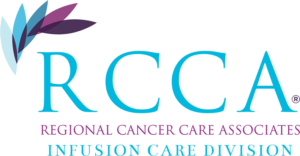What Is Infusion Therapy?
There are several ways patients can receive medication, such as orally or directly onto the skin with a lotion or patch. With most methods, it takes time for the medicine to travel throughout the body. Infusion therapy is an alternative that delivers medication directly into a patient’s bloodstream intravenously. This innovative technique is used to treat a variety of cancerous and noncancerous conditions.
Regional Cancer Care Associates (RCCA) provides comprehensive care for cancer and blood disorders throughout New Jersey, Connecticut, Maryland, and the Washington, D.C., area. In addition, RCCA’s 20+ community-based care centers provide infusion therapy for a wide variety of non-cancerous conditions, with its highly experienced infusion nurses and other staff members administering medications prescribed by neurologists, rheumatologists, gastroenterologists and others, with an RCCA physician on site during infusions. Here, we explain what infusion therapy is and which diseases it can help treat.
Infusion therapy refers to any medication administered to patients intravenously. Several types of medication can be delivered using infusion therapy, including:
- Chemotherapy drugs
- Antibiotics
- Nutrients
- Fluids
- Pain medication
- Biologic medications
Infusion therapy has several documented benefits, making it an ideal treatment method for many patients. Reasons that physicians and their patients often prefer infusion therapy over other treatments include:
Rapid Response to Medication
Medication is only effective once it reaches the organ or other part of the body it is intended to treat. In most cases, the effects of medication are not felt instantly. For example, medication taken orally must first make its way through the digestive system before alleviating symptoms. Infused medication bypasses processes like these and is rapidly absorbed by the body, helping treat patients much more quickly.
Accurate Dosing of Medicine
The optimal dosages of many medications are based on the patient’s weight, with the dose being expressed as, for example, X milligrams per kilogram of weight. With infused therapies delivered at a care center, the patient’s weight can be confirmed and the correct dose delivered. Similarly, when a patient comes to a care center for an infusion, clinicians can confirm that a medication was given on a certain date. When pills or medications are taken at home, a patient may forget a dose, and there is no way for his or her doctor to confirm that the medication was taken as directed.
Enhanced Treatment Method
When medication is administered intravenously, the medicine is directly injected into the patient’s bloodstream. Because the digestive process can reduce the effectiveness of some drugs taken orally, receiving medication intravenously can deliver a higher concentration of the medicine.
Easier Treatment Technique
Patients who have difficulty swallowing may be unable to take any oral medications. In other cases, the type of medication a patient needs is not offered in pill form. Infusion therapy addresses both of these concerns.
Cancer and Noncancer Applications
Infusion therapy may be recommended to patients with a wide range of medical conditions. Infusion therapy is most notably used to help patients with various cancer types, delivering drugs to kill cancerous cells before they spread. Two of the most common forms of infusion therapy when treating cancer patients are chemotherapy and immunotherapy.
While infusion therapy is often used to treat patients with cancer, individuals with other types of medical conditions can benefit from infusion therapy, as well. The following are additional applications for infusion therapy:
Chronic Diseases
Chronic diseases are broadly defined as conditions that last one year or more and that require ongoing medical attention. Chronic diseases often limit daily activity, making it difficult for patients to maintain their regular lifestyle. Unfortunately, there are no known cures for many chronic diseases, making the need for medication crucial.
Regular infusion of monoclonal antibody drugs, corticosteroids, and other medications can help patients manage symptoms of multiple sclerosis (MS), lupus, or Crohn’s disease, among many other chronic conditions. Chronic joint conditions also can be treated with infusion therapy, as it can help relieve pain and stiffness. It can also slow or limit additional joint damage.
Infectious Diseases
Patients with methicillin-resistant Staphylococcus Aureus (MRSA) and other infectious conditions can benefit from the consistent doses of antibiotics delivered by infusion therapy. The infused medication will work to effectively eliminate the virus, bacteria, or fungus from the body.
Pain Management
Patients with chronic or acute pain may find relief with infusion therapy. Doctors can recommend an implanted infusion pump to help patients who are experiencing long-term, debilitating pain.
Nutritional Support
Patients whose digestive systems do not function properly, such as during recovery from stomach surgery or as a result of gastrointestinal disorders, need an alternative means of receiving essential nutrients. Necessary nutrients can be delivered directly into a patient’s stomach or small intestine by way of infusion therapy.
Discover More About Infusion Therapy
Whether to treat a patient with cancer or help an individual manage a chronic condition, infusion therapy can be a key part of a patient’s treatment plan. The team of medical oncologists, hematologists, nurses, pharmacists, and other healthcare professionals at Regional Cancer Care Associates offers advanced infusion therapy to help patients with a wide range of cancerous and noncancerous conditions. People in New Jersey, Connecticut, Maryland, and the Washington, D.C., area who are wondering if infusion would benefit them should contact a Regional Cancer Care Associates today or request an appointment at one of RCCA’s more than 20 locations.

